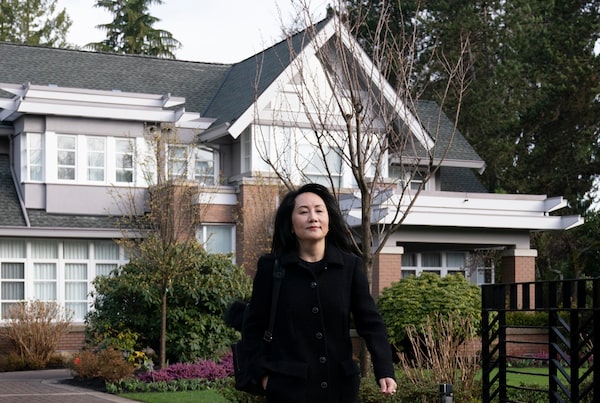
Meng Wanzhou, Chief Financial Officer of Huawei, leaves her home in Vancouver on March 25, to go to B.C. Supreme Court.JONATHAN HAYWARD/The Canadian Press
A lawyer for Canada’s attorney general says there’s no evidence that the RCMP shared the serial numbers with U.S. investigators of the devices of Huawei executive Meng Wanzhou.
John Gibb-Carsley told the B.C. Supreme Court that the burden of proof is on Meng’s legal team to show the numbers were shared, but they can’t do it.
“We say there’s no evidence of that,” he said Thursday.
Meng’s legal team is arguing that proceedings in her extradition case should be stayed because of misconduct by RCMP and border officers involved in her arrest.
Her lawyers say a senior RCMP officer improperly shared the serial numbers, which they describe as a “gateway” to more personal information such as photos and contacts.
Meng was arrested at Vancouver’s airport in December 2018 at the request of U.S. officials to face fraud charges that both she and Huawei deny.
Her arrest fractured Canada’s relations with China and the subsequent detention in China of Canadians Michael Spavor and Michael Kovrig has widely been seen as retaliation.
The court has seen e-mail evidence that the Federal Bureau of Investigation asked for the serial numbers of the devices and RCMP collected them, but the email chain goes cold before confirming if they were sent or not.
The senior officer at the centre of the email chain, Staff Sgt. Ben Chang, has since retired. In written testimony, he says he didn’t share the numbers, but he has refused to appear in court for cross-examination.
Gibb-Carsley told the judge that the fact-finding inquiry about number sharing has broader implications about Meng’s claims of what happened.
“It is symptomatic of how (Meng’s lawyers) have created their narrative, that what’s driving the actions of the RCMP and CBSA was a covert criminal investigation to assist the FBI,” he says.
A factual determination that the numbers weren’t shared is important for refuting the overarching allegations of abuse, misconduct and prejudice of the legal process, Gibb-Carsley says.
There’s nothing “magical” about electronic serial numbers, which are physical markings on devices that are important for continuity of evidence, he said.
“In this file, (electronic serial number) has taken on an exotic persona, more than I say it deserves,” he says.
He challenged an assertion from Meng’s team that Chang may have shared the numbers via phone, text or from a personal e-mail account.
The alphanumeric numbers are so long that delivering them by phone or text would be unlikely, Gibb-Carsley responded. And given that the request was received via Chang’s RCMP e-mail account, he said it also doesn’t make sense that he would then transmit them from a personal account.
The court heard that Chang’s RCMP emails and text messages were wiped when he retired in June 2019, six months after Meng’s arrest.
Gibb-Carsley said there’s “simply no merit” to claims from Meng’s team that it involved the destruction of evidence or that it “prejudiced” Meng’s extradition case in any way.
Our Morning Update and Evening Update newsletters are written by Globe editors, giving you a concise summary of the day’s most important headlines. Sign up today.